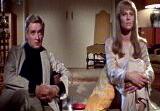Fahrenheit 451
1966 UK
Dir: Francois Truffaut
Str: Oskar Werner, Julie Christie, Cyril
Cusack



Is it possible to exist such kind of society actually all writing
activities are prohibited? Please don't ask. After all, Fahrenheit
451 is a SF movie.
Fahrenheit 451 depicts the future world where the possession of
books is strictly prohibited. Even all the written characters seem to have been banned from this hypothetical world.
Astonishingly, there is even such a scene as the protagonist of this movie (played by Oskar Werner) is reading
a cartoon magazine instead of a newspaper. As you probably know well, in historical China, actually there was such
a period when books were banned and burned. But, in this case, I presume that writing activity itself was not the
direct target of the prohibition, but rather, the particular background thoughts described in books must have been
the actual target. On the other hand, in this movie's case, as there seems to appear no written text message at
all anywhere in it, I cannot help assuming that writing activity itself is supposed to be prohibited in this future
world. Is it possible such kind of society exists? Probably, this is not the question that we should ask as to
this movie. After all, it is a science fiction.
This movie's crisp and abstract images are quite excellent. Thanks
to the photographer Nicolas Roeg.
Fahrenheit 451 is based upon the same name novel written by the famous
SF writer Ray Bradbury. As I have never read this novel, I don't know whether or not the movie is an accurate rendition
of this novel. But, I can surely say that the atmosphere is quite marvelous. As the movie was directed by the hand
of the famous French director Francois Truffaut, it has quite a different flavor than usual Hollywood SF movies.
Especially crisp and almost abstract images shot by the photographer Nicolas Roeg who himself becomes a famous
director in due time is quite appealing to the eyes of having been bored of the overly SFXed, unabashedly exaggerated
recent movies. Furthermore, all the events take place in very limited range (all events occur in a small village)
despite the subject. Therefore, overall feeling is rather tranquil and poetic. Had this movie been made by some
Hollywood megalomaniac director, it would have certainly been an extremely flamboyant extravaganza, for the story
has every element of being likely to become so. I heard that the movie will be remade by Australian actor/director
Mel Gibson. I hope he won't change this stunning movie into a tremendously huge but extremely hollow crap movie.
Fahrenheit 451 affectionately shows us how novels and poems are
precious for one's inner lives.
Anyway, as I mentioned before, this movie's strength resides in its poetic
aspect. Especially, the last scene where many exiled people are citing famous novels and poems by heart in falling
snow is astonishingly impressive. Watching this scene, I am reminded of the fact that the life of any person has
two sides; that is, one is external and related to an actual life that makes him/her physically alive and therefore
many concessions to authorities are absolutely necessary, and the other is rather inner and spiritual one by which
one can find the meaning of his life. I think that even modern life which seems to have emancipated human beings
from miserable lives of medieval age (I avoid arguing about whether actually the life of medieval age was miserable
or not here) seems to place much stress upon the former aspect. Nevertheless, it goes without saying that novels
and poems are one method according to which man can literally reconstruct own life by retracing the inner states
of the persons who wrote them. Fahrenheit 451 is affectionately showing this precious value of books in
constrast to the uniformity of highly controlled society.
All the SF movies depicting future world seem to be always
concentrating on darker aspects. Is it possible, a happy
futuristic SF movie?
But, it is also true that such kind of latent power that might eventually cause
social upheaval sometimes becomes a serious matter for the authorities that always want to keep the current state
of society unchanged, and, moreover, such conservative mind set easily permeates even among those who are governed
by authorities. In this movie, Oskar Werner cites some kind of poem in front of four women. But, except one woman,
they can't accept the value of the poem or rather refuse to accept it without knowing that they are always forcing
themselves into the mental state where a certain censor mechanism is always filtering out the elements that have
been considered to be inappropriate to current condition. And this scheme is so effective that they don't even
notice they themselves have long been one of those authorities. In this regard, there is no doubt in that Fahrenheit
451 is handling an anti-authoritative aspect by depicting the future world that is totally controlled by authorities.
I am always wondering why almost all SF movies depicting the future world have this anti-authoritative element,
and are willing to show the darker aspects of the future world. There seems to be no such SF movies that are illustrating
the bright side of the future world; i.e. happy futuristic SF movies. Judging by those dreary SF novels and movies
like 1984 or Brazil , for us, human beings, future society seems to be always considered to be suppressed
by some authoritative apparatus. But, in this aspect, compared to those movies that
have no salvation streak in the story at all, Fahrenheit 451 has one great advantage over them in suggesting
that any situation would be changeable by altering own inner state, even if outer condition has never changed.
Through the gradual alteration of Oskar Werner's mind state, you will be able to easily grasp the potentiality
of this power; i.e. mental liberation (or revelation).
But, I think the technology of mass production of printed books
made the advent of highly controlled society possible.
But, about this movie, there was one point I couldn't understand. That was,
highly controlled society is rather the result of print-enabled written-material-originated technology, not the
result of the absence of it, nevertheless the movie shows the highly controlled society that bans and burns printed
materials. According to the eminent sociologist Marshall McLuhan, when the age of the mass production of printed
books arrived, the world changed from oral and audile-tactile based society to highly visualized one, which, in
turn, succeeded in producing homogeneity and abstraction. Highly controlled society certainly needs these characteristics
to retain their power. Because, the opposite characteristics such as versatility, hybridity and concreteness hinder
the formation of the strict structure they need for maintaining the control over people. Books produced these characteristics,
not prevented them from being formed. When I said in the first paragraph "Is it possible such kind of socirty
exists?", this aspect is also on my mind. Besides the obvious fact that, without any writing activity, it
would be impossible to maintain various tasks needed for retaining society, it's also absolutely true that management
of society could be made possible only after the ability to retain homogeneity and repeatability had been acquired,
and, for this matter, mass production of printed books certainly enabled to actualize it.
In this movie, there are many scenes where we can feel
audile-tactile senses.
Then, why has the movie succeeded in conveying the affectionate feeling toward
books, if producing books is the prerequisite of highly controlled society to which the movie obviously opposes?
I can answer this question with two ways. The first answer is, though this is a quotation from McLuhan's book The
Gutenberg Galaxy, "print created national uniformity and government centralism, but also indivisualism
and opposition to government as such". In short, printed books has influenced upon two sides that are completely
opposite to each other. Also McLuhan says in this book, "If print made the vernaculars into mass media, they
also constituted a means of central government control of society..... But the very nature of print creats two
conflicting interests as between producers and consumers, and between rulers and ruled. For print as a form of
centrally organized mass-production ensures that the problem of freedom will henceforth be paramout in all social
and political discussion." So the reason why now we are capable of talking about "freedom" is because
we could get foothold of discussing it through the prevalence of printed books. Therefore, the scene where all
the exiles from authorities are citing books and poems clealy shows this aspect of printed books; that is, printed
books brings us a method of resisting authorities to articulate our cry for freedom, as well as authorities themselves,
by enabling us to utilize our own free will. The second answer is that books depicted in this movie aren't the
representation of the books produced by mass unit, but rather the representation of the books produced before the
arrival of mass production age. Before mass production of printed books started, books were usually replicated
by some persons' hand, or read aloud in front of audience. Therefore, books were also related to audile-tactile
senses as well as visual senses at that time. Likewise, in this movie, there are many scenes where we can feel
audile-tactile senses. For example, the aforementioned last scene shows us many people reciting books audibly.
And the scene where Oskar Werner reads books orally with his fingers touching and tracing the texts on the books
he is reading as if caressing his wife (Ironically, he becomes estranged with his wife because of his possession
of books that is, of course, forbidden), and even the scene where the pages of burned books are curling up in the
flame will surely bring us tactile feeling. Thus, in this movie, the restoration of audile-tactile senses is suggested
through the affectionate handling of reading books, and, by showing us, as a contrast, highly controlled society
that utilizes only visual senses (a large big display seems to be the main method of communication in this movie),
this movie seems to have succeeded in efficiently evoking affectionate feelings toward books in the audience's
mind.





